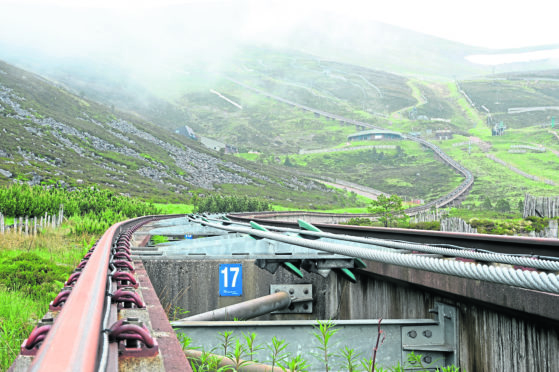Hopes that the Cairngorm funicular could be repaired in time to bring a boost to the Highlands’ struggling tourism sector this year have been dashed.
Yesterday, Highlands and Islands Enterprise (HIE) chief executive Charlotte Wright admitted the mountain railway would not reopen before winter 2021, after the Covid-19 crisis delayed vital decisions on the controversial multi-million project.
Ms Wright’s comments came as Scotland’s Auditor General Caroline Gardner again warned the Scottish Government and HIE, which owns the troubled Cairngorm Mountain ski centre, face “tough decisions” on how to secure a sustainable operation at the resort.
The funicular, built at a cost of £19.5million and opened in 2001, has been out of action since September 2018, after beams supporting its track were found to have become unsafe. Estimates have put the cost of repairing the 1.2-mile railway at £10-15m and removing it at up to £13.3m.
In November, HIE said in a “best case scenario” it would reopen in time for this winter’s skiing season, following repairs this summer.
Last month the agency was granted planning permission by the Cairngorm National Park Authority to carry out the repairs to 63 of the funicular’s 94 supporting piers. HIE had hoped work could start on in the mountain in May, but a decision by its board to give the project the go-ahead was delayed by the outbreak of the pandemic.
Ms Wright said a board meeting would now be held “later in the summer” to consider a business case determining the next steps for the funicular. The board’s decision will also need the approval of the Scottish Government, which will have to provide additional funds to the agency for the work.
The chief executive admitted the agency “can’t make any guarantees at present,” but added there was a “fair prospect of the funicular being back in service in winter season 2021-22.”
Ms Wright said: “Now we are currently finalising a detailed case, including an options appraisal. This will consider the best way forward, whether that is through reinstating the funicular, or removing or replacing it.
“We are progressing this as quickly as possible and hope to be able to put a proposal to Scottish ministers later in the summer.”
Ms Wright said that if it was decided to repair the railway, some work could be carried out in the remainder of this summer, before having to be halted for the winter.
She continued: “Obviously we have to work around being on Cairngorm Mountain. There’s always the winter season to be dealt with, so there will be a hold then and then back again as soon as we are able at the end of winter.
“It’s difficult to say without the full decision making, but if all of that was the process and agreement, then potentially we see the funicular being back for winter 21/22.”
Badenoch and Strathspey councillor, Bill Lobban, said few people in the area had expected the railway to be repaired in time for this year’s skiing season.
He added: “Cairngorm is the driving force of out winter business, so this will not help the impact that the Covid-19 crisis is having on our tourist sector.
“But it is important to remember Cairngorm will be open this winter and there will be skiing there, even without the funicular.”
HIE acted appropriately but hard decisions ahead, says watchdog
In a report published today, Scotland’s Auditor General Caroline Gardner concluded that Highlands and Islands Enterprise (HIE) “acted appropriately” when it selected Natural Assets Investments Limited (Nail) to manage the Cairngorm winter sports resort.
The verdict followed a probe by Audit Scotland into HIE’s dealings with Nail and its subsidiary, Cairngorm Mountain (CML), which went into administration in November 2018, four years into a 25-year contract to run the ski centre.
But Ms Garner said that in light of financial risks HIE identified ahead of the deal, the agency would have been better placed to react to problems if it had reviewed Nail’s financial standing “on an ongoing basis”.
HIE was forced to step in and set up a new company Cairngorm Mountain (Scotland) to keep the ski centre open and protect jobs there when Nail placed CML into administration shortly after the resort’s funicular was taken out of service on safety grounds.
Ms Gardner said: “HIE and the Scottish Government now face tough decisions on how to secure a sustainable operation at Cairngorm Mountain.
“The Covid-19 pandemic increases the uncertainty around the costs and business model required for the mountain in the longer-term. “
HIE’s chief executive, Charlotte Wright, said the agency had put new processes in place that met recommendations in the Auditor General’s report.
Ms Wright said: “Both Audit Scotland and the Scottish Government have now carried out thorough investigations of HIE’s decision to appoint Nail and of the period when they ran operations at Cairngorm.
“We welcome these findings, which provide a valuable insight into an extremely challenging set of circumstances for Cairngorm and for HIE. Their conclusions support the view that HIE acted correctly and professionally throughout this period.”
John Finnie, Scottish Greens MSP for the Highlands and Islands, said: “This is the second time in a decade that HIE had to step in to save the resort after third party operators ran into difficulty.
“It is my view that an amenity of such high importance to the area should be operated in the public interest, whether that be directly by HIE or potentially by the community itself.”
